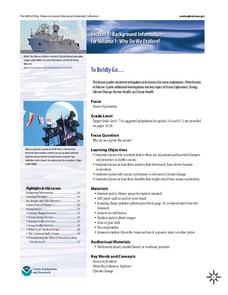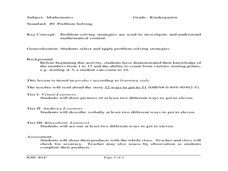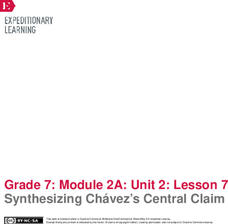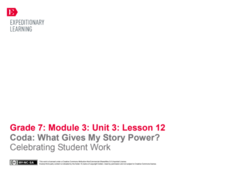Bantam Books
The Tempest: Kinesthetic Grammar Approach
Though beautiful, William Shakespeare's prose can be inhibiting for learners who are new to his works. A lesson based on The Tempest guides high schoolers through the paraphrasing process, including noting the subjects and verbs to align...
American English
Welcome to the Color Vowel Chart
Focus English language learners' attention on word stress and phrase stress with a pronunciation chart that breaks the sounds into moving and non-moving vowel sounds. The chart tool uses colors and key words to indicate where to put the...
Baylor College
Gravity and Muscles
Humans are so used to gravity as a force that we don't tend to pay much attention to it on a daily basis. Through a couple simple activities, learners experience changes to their center of gravity and come to the understanding that...
Curated OER
Story Structure Slide Show
Analyzing the sequence of actions in dramatic stories leads to deeper comprehension of story structure. The class identifies the main actions in each section of a story and develops frozen tableau's for the identified actions of the...
National Museum of Mathematics
Hands-On Data Analysis
Jump at the chance to use this resource. A kinesthetic activity has classmates jumping in several different ways (standing, single-step, and multiple-step jumps) to create handprints on poster paper taped to the wall. They measure the...
Alabama Wildlife Federation
Big Fish, Little Fish
Tag, you're eaten! A lesson on predator-prey relationships uses the game freeze tag as a model. Learners become either a predator or prey and play a game of tag as the prey tries to reach areas that house food and shelter. During the...
NOAA
To Boldly Go...
When we think of ocean exploration, many of us have visions of sunken pirate ships full of treasure or mysterious creatures of the deep. What really motivates deep-sea investigation? The first in a series of diverse six-part lessons...
Carolina K-12
How Do I Pre-Register and Vote in North Carolina?
Did you know that in some states your pupils can pre-register to vote? Teach the advantages to pre-registering and engage the classroom in an intriguing discussion about youth voting trends. Class members participates in a live polling...
Curated OER
Reading Word Recognition, Fluency, and Vocabulary
Eleventh graders analyze words that derive meaning from Greek, Roman, and Norse myths. In this myth vocabulary lesson plan, 11th graders work in learning groups as visual learners, kinesthetic learners, and artistic learners to identify...
Curated OER
Writing Application: The Canterbury Tales
Students read stories from The Canterbury Tales by Geoffrey Chaucer and create their own tale. In this writing applications lesson, students read the tales and analyze the specific details that Chaucer use. Students work in groups to...
Curated OER
Learning Styles in Math
Students discover which learning style works best for them in a math setting. In this math comprehension lesson, students create different combinations of numbers that equal the sum of 11. Students determine if they are better visual,...
EngageNY
Vocabulary: Finding the Meaning of Words in Context in The Boy Who Loved Words
Here is a lesson plan that invites learners to engage in a kinesthetic activity that allows them to physically move and manipulate words in order to think about ways to understand vocabulary in context. After that activity is complete,...
Alabama Learning Exchange
Exponents and Division
Create a human fraction to learn about division of exponents. Scholars develop the rule for division of exponents by being part of a human fraction to explore and justify the rule. They also consider zero exponents and negative exponents.
NOAA
Individual Species in the Deep Sea
A tube worm's outer covering is made of chitin, the same material that makes up the shells of lobsters and crabs. Scholars create tube worms and analyze and discuss the longevity of organisms living near cold seeps. They then discuss and...
American Chemical Society
What is a Chemical Reaction?
When a candle burns down, what happens to the mass that appears to be shrinking? Lesson begins with a demonstration of the chemical reaction of a candle burning. Then scholars use atom models to observe conservation of mass concretely.
WE Charity
Elementary–Module 3: Food Waste
Before pupils discard anymore of their uneaten vegetables, they may want to learn more about food waste. Here's a resource to help them do just that! Using discussion and video, scholars discover how innovators are tackling the issue. As...
EngageNY
Analyzing Character and Theme: Tracking Control in A Midsummer Night’s Dream
Scholars examine how characters try to control one another in Shakespeare's A Midsummer Night's Dream. They engage in a read-aloud and class discussion to iron out ideas. They also work in small groups to complete a note-catcher...
EngageNY
Analyzing the Resolution of the Play: World Café Discussion
It's time to get active! Scholars participate in a World Café protocol to promote discussion and leadership. They leave their seats and move from group to group to discuss critical questions related to their read-aloud of Shakespeare's A...
EngageNY
Final Performance Task: Sharing Visual Representations of Position Papers
It's time to put down those pencils and celebrate! Scholars share the visual representations of their position papers with the class. They participate in a gallery walk to view each other's work, writing a piece of praise for their...
EngageNY
Synthesizing Chávez’s Central Claim
Class members play an interactive game, matching strips of paper containing rhetorical devices with examples from César Chávez use rhetoric in his 1984 speech, "Address to the Commonwealth Club of California." Next, partners discuss...
EngageNY
Coda: What Gives My Story Power? Celebrating Student Work
It's time for a celebration! Scholars go on a gallery walk around the classroom to view their peers' completed illustrated children's stories. Using sticky notes, pupils provide feedback about the powerful elements they find in their...
EngageNY
Identifying Main Ideas and Supporting Details: What’s Going On in the Teenage Brain?
What's going on in the teen brain? Pupils consider the question as they continue reading an informational article about the topic. While reading, they use a Thinking Log worksheet and an anchor chart to track their understanding of...
EngageNY
Forming a Research-Based Claim: Analyzing Risks and Benefits for Stakeholder
Welcome to the World Café, where lively debate is on the menu! Scholars participate in the World Café protocol, moving between discussion groups to decide if the American Academy of Pediatrics should increase its adolescent screen time...
Teaching Tolerance
Social Media for Social Action
Engage in activism, not slacktivism! Scholars discuss social media and the Internet as tools for social change. Next, they engage in a close reading strategy called Thinking Notes as they read an article about social media activism.
Other popular searches
- Kinesthetic Learner Math
- Literacy Kinesthetic Learner
- Kinesthetic Learner English
- Kinesthetic Learner Reading
- Kinesthetic Learner History
- Kinesthetic Learner Algebra
- Kinesthetic Learner Health
- Kinesthetic Learner French
- Kinesthetic Learner + Math
- Kinesthetic Learner Math Time

























